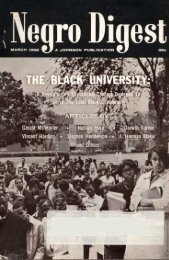3. Strain, Christopher Barry. “Civil Rights and ... - Freedom Archives
3. Strain, Christopher Barry. “Civil Rights and ... - Freedom Archives
3. Strain, Christopher Barry. “Civil Rights and ... - Freedom Archives
You also want an ePaper? Increase the reach of your titles
YUMPU automatically turns print PDFs into web optimized ePapers that Google loves.
Events picked up across the border in Mississippi in June 1966 . Civil rights<br />
leaders flocked to the Menniith March Against Fear after James Meredith was shot from<br />
ambush on the highway . The march from Memphis to Jackson--a lone crusade begun by<br />
Meredith on June S as a display of defiance against white oppc+ession--gained momentum<br />
as Dr. Martin Luther King, Jr. of the Southern Christian Leadership Conference, Floyd<br />
McKissick <strong>and</strong> James Farmer of CORE, Stokely Carmichael of the Student Nonviolent<br />
Coordinating Committee <strong>and</strong> others picked up where Meredith was gunned down (near<br />
Como) <strong>and</strong> spearheaded the demonstration as it pressed deeper into Mississippi . The<br />
Deacons were thet+e, too, but only after much debate, <strong>and</strong> much tumult. It was there in<br />
Mississippi, during the Meredith March Against Fear, that the Deacons exploded onto the<br />
national scene<br />
Charles Sims <strong>and</strong> his Deacons played a pivotal role in the Meredith March<br />
Against Fear (also known as the Gr+eenwood March), which st<strong>and</strong>s as a watershed of the<br />
national civil rights movement, <strong>and</strong> the flashpoint for the ongoing debate concerning the<br />
place of violence within the movement. Because of the Deacons'controversialimcege <strong>and</strong><br />
Christian teachings . Thomas Merton, a Christian theologian, argued in 1%8 that denying<br />
force in all instances is immoral, <strong>and</strong> that sometimes the only way to protect human life<br />
<strong>and</strong> rights effectively is by "forcible t+esistance"against unjust encroachment . Merton<br />
questioned placing the onus of responsibility for utilizing nonviolence on oppt+essed<br />
minorities struggling for equality. "Instead of preaching the Cross for others <strong>and</strong> advising<br />
them to suffer patiently the violence which we swatly impose on them, with the aid of<br />
armies <strong>and</strong> police, we might conceivably raognize the right of the less fortunate to use<br />
force, <strong>and</strong> study move seriously the practice of nonviolence <strong>and</strong> humane methods on our<br />
own part . . .:' Thomas Merton, Faith <strong>and</strong> Violence : Christian Teaching <strong>and</strong> Christian<br />
(South Bend : University of Notre Dame Pc+ess, 1%8), 3-10 .<br />
Gene Roberta, "Mississippi March Gains Momenttun," New York Times (June 10,<br />
1966): 1, 35 .<br />
133
















